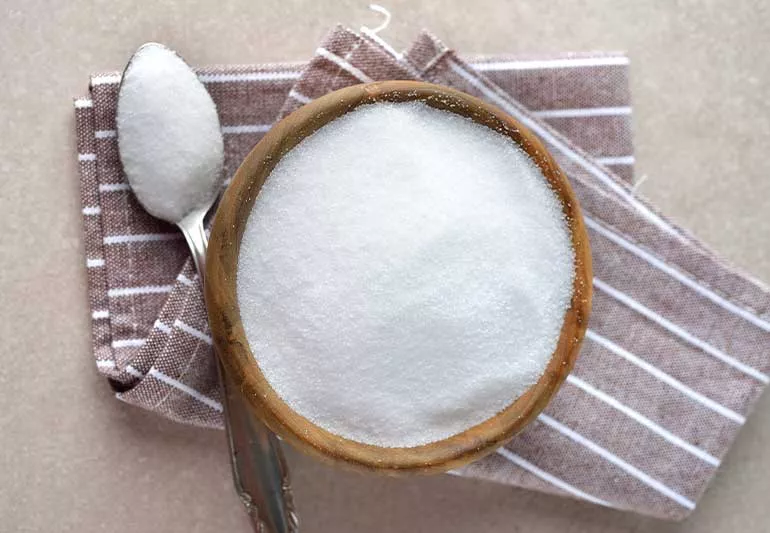Table of Contents
Discover the key differences between popular artificial sweeteners like monk fruit, stevia, erythritol, and xylitol. Learn which one is the healthiest choice for your diet.
As the demand for sugar-free and low-calorie alternatives continues to grow, the world of artificial sweeteners has become increasingly complex. The choices can be overwhelming, from natural options like monk fruit and stevia to sugar alcohols like erythritol and xylitol.
In this topic, we’ll explore the unique properties, benefits, and potential drawbacks of these popular sweeteners, empowering you to decide the best fit for your dietary needs and health goals.
I had a recent question related to monk fruit and Stevia and erythritol and xylitol .
Which one’s the best ?
Which one’s the worst ?
So let’s just talk about these 4 sweeteners .
Monk fruit , and stevia and erythritol all have a 0 glycemic index , so they will not increase insulin .
Xylitol as a sugar substitute

Xylitol on the glycemic index is 30 , so it’s low , but it’s still a little spike .
If you consume this 1 in small amounts , it should not be a problem .
Now , I do use xylitol for a lot of different recipes simply because it really tastes just like sugar .
Summary
Xylitol is a sugar alcohol that is naturally found in various fruits and vegetables. It has a similar sweetness to sugar but with a lower calorie count. Xylitol has been shown to have dental health benefits, as it can help prevent tooth decay.
How to use stevia

Stevia has a little bit of an aftertaste , but this is really good in things like , like flavoring water and carbonated water to make like a soda .
And it’s good in certain recipes .
Summary
Stevia is a natural, zero-calorie sweetener that comes from the Stevia rebaudiana plant. It is 200-300 times sweeter than regular sugar and does not affect blood sugar levels. Stevia is a popular choice for those looking to reduce their sugar intake while maintaining a sweet taste.
How to use monk fruit
Monk fruit also has a slight little aftertaste .
It’s really , really sweet , so you don’t need much of it .
Both of these are very similar .
They’re they kind of give a little bit of an aftertaste .
They don’t really taste a 100% like sugar but they’re good in certain recipes but not in others .
I don’t really use this 1 as much .
I use Stevia a little bit more .
Summary
Monk fruit sweetener is derived from the monk fruit, also known as the Luo Han Guo fruit. It is a natural, zero-calorie sweetener that is 200-300 times sweeter than regular sugar. Monk fruit sweetener does not affect blood sugar levels and is a great option for those following a low-carb or keto diet.
How to use erythritol

Now , Erythritol , doesn’t have the aftertaste , but it definitely does not taste like xylitol .
It has more of a , a cold taste , a cold sweet taste .
But I still use this in recipes because it’s great to combine this maybe with this or these 2 together and to have the , the right balance .
Now the other point about erythritol is sometimes it’s made from corn which is GMO .
So you wanna make sure this 1 is non GMO .
Same thing with xylitol .
This you want this from birch bark and non GMO .
Summary
Erythritol is a sugar alcohol that is naturally found in some fruits and fermented foods. It is a zero-calorie sweetener that does not affect blood sugar levels. Erythritol is often used in combination with other sweeteners to provide a more balanced taste.
Xylitol gum and ketosis
And if you’re actually chewing gum , make sure it’s xylitol gum , and don’t worry about it interfering with your intermittent fasting .
It’s not gonna bump you out of ketosis .
It’s such a small amount .
Avoid this sugar substitute
The gum that you don’t wanna consume is the gum with aspartame .
You wanna avoid these artificial sweeteners .
These are sugar alcohols and this is a fruit and this is from a plant .
So these are totally fine .
There’s a lot of other sugar alcohols and natural sweeteners that you can do but these are the common ones right here .
Will sugar alcohols cause a digestive problem?

Between these 2 , I found this 1 tends to give people a little more digestive , problem .
It consumed in larger amounts .
This 1 can be as well , But if you’re having small amounts , it doesn’t seem to be a problem .
But when you start making these keto bombs or these recipes , boy , it just tastes so good .
You wanna eat a lot of it ?
Well , then you’ll start getting some problems because they can act as a laxative or give you gas .
And sometimes you’ll hear this idea that if you consume anything sweet , whether it’s monk fruit or stevia , even though it’s 0 calories , it’s still gonna spike insulin .
I’ve never had a problem with that .
I never see a problem with that .
I wouldn’t worry about it .
key Points
- Monk fruit, stevia, and erythritol all have a 0 glycemic index, so they will not increase insulin.
- Xylitol has a glycemic index of 30, so it’s very low, but it can still cause a small insulin spike. Xylitol is a popular sugar substitute because it tastes just like sugar. Look for non-GMO, birch bark-derived xylitol. Xylitol chewing gum is a popular option because it won’t kick you out of ketosis!
- Stevia is a good sweetener alternative that can be added to flavored water or carbonated water to make a sweet drink or soda. Although it has an aftertaste, it’s good in certain recipes.
- Monk fruit is very sweet, so you don’t need much. It’s very similar to stevia, and does have a bit of an aftertaste.
- Erythritol has a cold, sweet taste. It’s often made from GMO corn, so always look for non-GMO erythritol.
- Erythritol and xylitol are sugar alcohols, monk fruit is a type of fruit, and stevia comes from a plant. These keto-friendly alternative sweeteners are not artificial! Avoid aspartame and other artificial sweeteners.
- Erythritol and xylitol have the potential to cause digestive upset, gas, and laxative effects if consumed in large amounts. If you’re only consuming small amounts of these sugar alcohols, you shouldn’t have any issues.
FAQ
Is xylitol stevia or erythritol better?
Xylitol, stevia, and erythritol are all popular artificial sweeteners used as alternatives to sugar. Each has its unique characteristics and benefits. Xylitol is known for its ability to prevent tooth decay and promote oral health, while stevia is often preferred for its natural origin and negligible calorie content. Erythritol, on the other hand, is a sugar substitute that is low in calories and does not raise blood sugar levels. Ultimately, the choice between these sweeteners depends on individual preferences and dietary needs[1].
Does stevia affect ketosis?
Stevia, being a low-calorie sweetener, does not directly affect ketosis. However, it is essential to note that stevia can be used in moderation as part of a ketogenic diet. Stevia does not contain carbohydrates, which are the primary macronutrients that can impact ketosis. Therefore, stevia can be safely consumed in small amounts without disrupting the body’s ketosis state[1].
Is monk fruit erythritol keto-friendly?
Monk fruit sweetener is generally considered keto-friendly because it is low in carbohydrates and does not raise blood sugar levels. Additionally, monk fruit sweetener is often blended with other sweeteners like erythritol, which is also keto-friendly. When used in moderation, monk fruit sweetener can be a suitable alternative to sugar for those following a ketogenic diet[1].
Which is the healthiest artificial sweetener?
The healthiest artificial sweetener is often debated among health experts. However, based on current research and nutritional profiles, erythritol is often considered the healthiest option. Erythritol is a sugar substitute that is low in calories, does not raise blood sugar levels, and is not metabolized by the body. This makes it an attractive choice for those managing blood sugar levels or following a low-carb diet[1].
Best artificial sweeteners monk fruit stevia erythritol & xylitol
Each of these sweeteners has its unique benefits and uses. Monk fruit sweetener is known for its natural origin and negligible calorie content. Stevia is often preferred for its natural origin and low calorie count. Erythritol is a sugar substitute that is low in calories and does not raise blood sugar levels. Xylitol is known for its ability to prevent tooth decay and promote oral health. The best sweetener for you will depend on your dietary needs and preferences[1].
Artificial sweeteners monk fruit stevia erythritol & xylitol reviews
Reviews for these sweeteners vary based on individual preferences and uses. Monk fruit sweetener is often praised for its natural origin and negligible calorie content. Stevia is often preferred for its natural origin and low calorie count. Erythritol is praised for its low calorie count and ability to not raise blood sugar levels. Xylitol is known for its ability to prevent tooth decay and promote oral health. Reviews for these sweeteners can be found on various health and wellness websites[1].
Xylitol vs erythritol vs stevia
Xylitol, erythritol, and stevia are all popular artificial sweeteners used as alternatives to sugar. Each has its unique characteristics and benefits. Xylitol is known for its ability to prevent tooth decay and promote oral health, while stevia is often preferred for its natural origin and negligible calorie content. Erythritol is a sugar substitute that is low in calories and does not raise blood sugar levels. The choice between these sweeteners depends on individual preferences and dietary needs[1].
Monk Fruit Sweetener
Monk fruit sweetener is a natural sweetener derived from the fruit of the Siraitia grosvenorii plant. It is known for its negligible calorie content and natural origin. Monk fruit sweetener is often used as a sugar substitute in various recipes and is considered keto-friendly when used in moderation[1].
Monk Fruit without erythritol
Monk fruit sweetener can be used without erythritol, but it is often blended with other sweeteners like erythritol to enhance its sweetness and provide a more balanced taste. When used without erythritol, monk fruit sweetener can be a bit less sweet, but it still provides a natural and sugar-free alternative to sugar[1].
Monk fruit vs stevia
Monk fruit sweetener and stevia are both natural sweeteners used as alternatives to sugar. Monk fruit sweetener is known for its negligible calorie content and natural origin, while stevia is often preferred for its natural origin and low calorie count. The choice between these sweeteners depends on individual preferences and dietary needs[1].
Best monk fruit sweetener no erythritol
The best monk fruit sweetener without erythritol is often a matter of personal preference. Some popular brands of monk fruit sweetener without erythritol include Lakanto and EZ-Sweetz. These brands offer a natural and sugar-free alternative to sugar without the addition of erythritol[1].
Artificial sweeteners monk fruit stevia erythritol & xylitol side
The side effects of these sweeteners vary based on individual tolerance and sensitivity. Monk fruit sweetener is generally considered safe and well-tolerated. Stevia can cause digestive issues in some individuals, while erythritol is known to cause stomach discomfort in rare cases. Xylitol can cause digestive issues and allergic reactions in some individuals. It is essential to consult with a healthcare professional before introducing any new sweetener into your diet[1].




